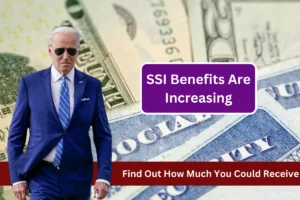Thinking about getting Social Security benefits can be a big decision. Many people see it as essential, but they don’t always realize the stress it can bring. When you’re in a tough situation, Social Security benefits can help keep you from falling into poverty. It’s important to take any chance to stay out of the worst-case scenario.
One opportunity you shouldn’t miss is applying for Supplemental Security Income, also known as SSI. This article will explain how to apply for this financial help if you’re having money troubles or know someone who is.
What is Social Security?
How Does Social Security Work?
Social Security is often thought of as a program for older people. It provides monthly payments to seniors who are 62 years or older. These payments are based on how much Social Security tax you’ve paid during your working life, and you need at least 10 years of payments to qualify.
The Social Security Administration (SSA) does more than just handle old-age and disability insurance. It also helps Americans who are struggling to meet their basic needs, giving them time to get back on their feet and achieve financial independence. This is the main purpose of SSI.
How to Apply for SSI
SSI is different from other SSA programs because you don’t need to meet tax requirements or make payments to get benefits. Here are the main criteria for applying:
- Age: You must be 65 years old or older.
- Income: You must earn $1,971 or less each month if you apply alone, or $2,915 if you apply as a couple.
- Assets: You must have $2,000 or less in assets if you apply alone, or $3,000 or less as a couple.
This program aims to help those at risk of poverty, so the standards are designed to support the most vulnerable people in society.
When Will You Get Your SSI Payment?
The schedule for receiving SSI payments is straightforward. The date you started receiving benefits determines when you’ll get your money each month. If you started getting benefits before May 1997, you’ll receive payments on the third of the month.
If you started after May 1997, you’ll get your payment on the first of the month unless that day is a weekend or holiday. In that case, the payment is made on the last business day before the scheduled date. For example, the next SSI payment will be issued on July 1st.
If your payment is delayed, the SSA suggests waiting at least three additional postal days before filing a claim. For more details on alternate payment days, visit the SSA website.
Receiving Social Security benefits, like SSI, can be a lifeline if you’re facing financial hardship. Understanding how to apply and the criteria you need to meet can make the process easier. Remember, this program is designed to help the most vulnerable, so don’t hesitate to apply if you qualify. For more information, visit the SSA website or contact your local Social Security office.
1. Who can apply for SSI?
Anyone 65 or older who meets the income and asset criteria can apply. You don’t need to be a U.S. citizen to qualify.
2. What documents do I need to apply for SSI?
You’ll need proof of age, income, and assets. This might include birth certificates, pay stubs, bank statements, and other financial documents.
3. How do I apply for SSI?
You can apply online at the SSA website, by phone, or in person at your local Social Security office.
4. How long does it take to get approved for SSI?
It can take several months to process an application. The SSA will notify you of their decision by mail.
5. Can I work and still receive SSI benefits?
Yes, but your earnings may reduce your SSI benefits. The SSA has specific rules about how much you can earn and still receive benefits.




